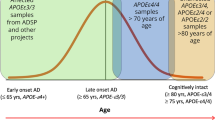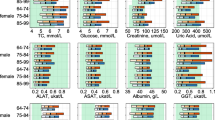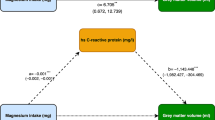Abstract
Background
As the global population ages, cognitive impairment (CI) becomes more prevalent. Tea has been one of the most popular drinks in the world. Several studies have demonstrated that tea consumption has an impact on cognitive function.
Objective
This study aims to examine the association between tea consumption and cognitive function and explore the potential effect of genetics on the relationship between tea consumption and CI risk in older adults.
Design
This is a prospective longitudinal study using data from the Chinese Longitudinal Healthy Longevity Survey (CLHLS).
Setting
Six waves of data from CLHLS containing 76,270 subjects were analyzed. Generalized estimation equations (GEE) with a logit link function were adopted to estimate the effect of tea consumption on CI risk from a cross-sectional and longitudinal perspective.
Participants
A population-based cohort of adults aged 65–105 years.
Measurements
The frequency and type of tea consumption were obtained by questionnaires. CI was measured based on MMSE. Polygenic risk was measured using the polygenic score approach described by the International Schizophrenia.
Results
The results showed that drinking green tea had a better protective effect on cognitive function than other types of tea, the incidence of CI gradually decreased with the increase of tea consumption frequency, and men were more likely to benefit from tea consumption. Additionally, we also found a significant interaction between tea consumption and genetic risk, measured by polygenic risk score (PRS).
Conclusions
Based on current research evidence, tea consumption, may be a simple and important measure for CI prevention.

Similar content being viewed by others
References
Zeng Y, Feng Q, Hesketh T, Christensen K, Vaupel JW. Survival, disabilities in activities of daily living, and physical and cognitive functioning among the oldest-old in China: a cohort study. Lancet. 2017; 389:1619–1629. DOI: https://doi.org/10.1016/S0140-6736(17)30548-2
Wu C, Gao L, Chen S, Dong H. Care services for elderly people with dementia in rural China: a case study. Bull World Health Organ. 2016; 94:167–173. DOI: https://doi.org/10.2471/BLT.15.160929
Hu X, Gu S, Sun X, et al. Cognitive ageing trajectories and mortality of Chinese oldest-old. Arch Gerontol Geriatr. 2019; 82:81–87. DOI: https://doi.org/10.1016/j.archger.2019.01.018
Feng L, Li J, Ng TP, Lee TS, Kua EH, Zeng Y. Tea drinking and cognitive function in oldest-old Chinese. J Nutr Health Aging. 2012; 16:754–758. DOI: https://doi.org/10.1007/s12603-012-0077-1
Feng L, Chong M.S, Lim WS, et al. Tea Consumption Reduces the Incidence of Neurocognitive Disorders: Findings from the Singapore Longitudinal Aging Study. J Nutr Health Aging. 2016; 20:1002–1009. DOI: https://doi.org/10.1007/s12603-016-0687-0
Sakurai K, Shen C, Ezaki Y, et al. Effects of Matcha Green Tea Powder on Cognitive Functions of Community-Dwelling Elderly Individuals. Nutrients. 2020; 12:3639. DOI: https://doi.org/10.3390/nu12123639
Mancini E, Beglinger C, Drewe J, Zanchi D, Lang UE, Borgwardt S. Green tea effects on cognition, mood, and human brain function: A systematic review. Phytomedicine. 2017; 34: 26–37. DOI: https://doi.org/10.1016/j.phymed.2017.07.008
Kakutani S, Watanabe H, Murayama N. Green Tea Intake and Risks for Dementia, Alzheimer’s Disease, Mild Cognitive Impairment, and Cognitive Impairment: A Systematic Review. Nutrients. 2019; 11:1165. DOI: https://doi.org/10.3390/nu11051165
Ng TP, Feng L, Niti M, Kua EH, Yap KB. Tea consumption and cognitive impairment and decline in older Chinese adults. Am J Clin Nutr. 2008; 88:224–231. DOI: https://doi.org/10.1093/ajcn/88.1.224
Feng L, Langsetmo L, Yaffe K, et al. No Effects of Black Tea on Cognitive Decline Among Older US Men: A Prospective Cohort Study. J Alzheimers Dis. 2018; 65:99–105. DOI: https://doi.org/10.3233/JAD-180103
Noguchi-Shinohara M, Yuki S, Dohmoto C, et al. Consumption of green tea, but not black tea or coffee, is associated with reduced risk of cognitive decline. PLoS One. 2014;9: e96013. DOI: https://doi.org/10.1371/journal.pone.0096013
Eskelinen MH, Ngandu T, Tuomilehto J, Soininen H, Kivipelto M. Midlife coffee and tea drinking and the risk of late-life dementia: a population-based CAIDE study. J Alzheimers Dis. 2009; 16:85–91. DOI: https://doi.org/10.3233/JAD-2009-0920
Xu H, Wang Y, Yuan Y, et al. Gender differences in the protective effects of green tea against amnestic mild cognitive impairment in the elderly Han population. Neuropsychiatr Dis Treat. 2018; 14: 1795–1801. DOI: https://doi.org/10.2147/NDT.S165618
Yang CS, Wang X. Green tea and cancer prevention. Nutr Cancer. 2010; 62:931–937. DOI: https://doi.org/10.1080/01635581.2010.509536
Bonner MR, Rothman N, Mumford JL, et al. Green tea consumption, genetic susceptibility, PAH-rich smoky coal, and the risk of lung cancer. Mutat Res. 2005; 582:53–60. DOI: https://doi.org/10.1016/j.mrgentox.2004.12.008
Yuan JM, Koh WP, Sun CL, Lee HP, Yu MC. Green tea intake, ACE gene polymorphism and breast cancer risk among Chinese women in Singapore. Carcinogenesis. 2005; 26: 1389–1394. DOI: https://doi.org/10.1093/carcin/bgi080
Xu WH, Dai Q, Xiang YB, et al. Interaction of soy food and tea consumption with CYP19A1 genetic polymorphisms in the development of endometrial cancer. Am J Epidemiol. 2007; 166:1420–1430. DOI: https://doi.org/10.1093/aje/kwm242
Lin IH, Ho ML, Chen HY, et al. Smoking, green tea consumption, genetic polymorphisms in the insulin-like growth factors, and lung cancer risk. PLoS One. 2012; 7: e30951. DOI: https://doi.org/10.1371/journal.pone.0030951
Zeng Y, Chen H, Ni T, et al. GxE interactions between FOXO genotypes and drinking tea are significantly associated with prevention of cognitive decline in advanced age in China. J Gerontol A Biol Sci Med Sci. 2015; 70: 426–433. DOI: https://doi.org/10.1093/gerona/glu060
Zeng Y, Chen H, Ni T, et al. Interaction Between the FOXO1A-209 Genotype and Tea Drinking Is Significantly Associated with Reduced Mortality at Advanced Ages. Rejuvenation Res. 2016; 19:195–203. DOI: https://doi.org/10.1089/rej.2015.1737
Zeng Y, Feng Q, Gu D, Vaupel JW. Demographics, phenotypic health characteristics and genetic analysis of centenarians in China. Mech Ageing Dev. 2017; 165:86–97. DOI: https://doi.org/10.1016/j.mad.2016.12.010
Chen Z, Lee L, Chen J, et al. Cohort profile: the Kadoorie Study of Chronic Disease in China (KSCDC). Int J Epidemiol. 2005; 34:1243–1249. DOI: https://doi.org/10.1093/ije/dyi174
Bycroft C, Freeman C, Petkova D, et al. The UK Biobank resource with deep phenotyping and genomic data. Nature. 2018; 562:203–209. DOI: https://doi.org/10.1038/s41586-018-0579-z
Chen H, Ye KX, Feng Q, et al. Trends in the prevalence of cognitive impairment at old age in China, 2002–2018. Alzheimers Dement. Published online November 27, 2023. DOI: https://doi.org/10.1002/alz.13545
Zeng Y. Towards Deeper Research and Better Policy for Healthy Aging —Using the Unique Data of Chinese Longitudinal Healthy Longevity Survey. China Economic J. 2012; 5:131–149. DOI: https://doi.org/10.1080/17538963.2013.764677
Rao RV, Subramaniam KG, Gregory J, et al. Rationale for a Multi-Factorial Approach for the Reversal of Cognitive Decline in Alzheimer’s Disease and MCI: A Review. Int J Mol Sci. 2023; 24:1659. DOI: https://doi.org/10.3390/ijms24021659
Anderson ND, Craik FI. 50 Years of Cognitive Aging Theory. J Gerontol B Psychol Sci Soc Sci. 2017; 72:1–6. DOI: https://doi.org/10.1093/geronb/gbw108
Li H, Jia J, Yang Z. Mini-Mental State Examination in Elderly Chinese: A Population-Based Normative Study. J Alzheimers Dis 2016; 53: 487–96. DOI: https://doi.org/10.3233/JAD-160119
Song J, Xu H, Liu F, Feng L. Tea and cognitive health in late life: current evidence and future directions. J Nutr Health Aging. 2012; 16:31–34. DOI: https://doi.org/10.1007/s12603-011-0139-9
Ma QP, Huang C, Cui QY, et al. Meta-Analysis of the Association between Tea Intake and the Risk of Cognitive Disorders. PLoS One. 2016;11(11):e0165861. DOI: https://doi.org/10.1371/journal.pone.0165861
Feng L, Gwee X, Kua EH, Ng TP. Cognitive function and tea consumption in community dwelling older Chinese in Singapore. J Nutr Health Aging. 2010; 14:433–438. DOI: https://doi.org/10.1007/s12603-010-0095-9
Ng TP, Aung KC, Feng L, Nyunt MS, Yap KB. Tea consumption and physical function in older adults: a cross-sectional study. J Nutr Health Aging. 2014; 18:161–166. DOI: https://doi.org/10.1007/s12603-013-0354-7
Valverde-Salazar V, Ruiz-Gabarre D, García-Escudero V. Alzheimer’s Disease and Green Tea: Epigallocatechin-3-Gallate as a Modulator of Inflammation and Oxidative Stress. Antioxidants (Basel). 2023; 12:1460. DOI: https://doi.org/10.3390/antiox12071460
Cabrera C, Artacho R, Giménez R. Beneficial effects of green tea—a review. J Am Coll Nutr. 2006; 25:79–99. DOI: https://doi.org/10.1080/07315724.2006.10719518
Johnson R, Bryant S, Huntley AL. Green tea and green tea catechin extracts: an overview of the clinical evidence. Maturitas. 2012; 73:280–287. DOI: https://doi.org/10.1016/j.maturitas.2012.08.008
Chacko SM, Thambi PT, Kuttan R, Nishigaki I. Beneficial effects of green tea: a literature review. Chin Med. 2010; 5:13. DOI: https://doi.org/10.1186/1749-8546-5-13
Lee JW, Lee YK, Ban JO, et al. Green tea (-)- epigallocatechin-3-gallate inhibits beta-amyloid-induced cognitive dysfunction through modification of secretase activity via inhibition of ERK and NF-kappaB pathways in mice. J Nutr. 2009; 139:1987–1993. DOI: https://doi.org/10.3945/jn.109.109785
Ehrnhoefer DE, Bieschke J, Boeddrich A, et al. EGCG redirects amyloidogenic polypeptides into unstructured, off-pathway oligomers. Nat Struct Mol Biol. 2008; 15:558–66. DOI: https://doi.org/10.1038/nsmb.1437
Rezai-Zadeh K, Arendash GW, Hou H, et al. Green tea epigallocatechin-3-gallate (EGCG) reduces beta-amyloid mediated cognitive impairment and modulates tau pathology in Alzheimer transgenic mice. Brain Res. 2008; 1214:177–187. DOI: https://doi.org/10.1016/j.brainres.2008.02.107
Lee YJ, Choi DY, Yun YP, Han SB, Oh KW, Hong JT. Epigallocatechin-3-gallate prevents systemic inflammation-induced memory deficiency and amyloidogenesis via its anti-neuroinflammatory properties. J Nutr Biochem. 2013; 24:298–310. DOI: https://doi.org/10.1016/j.jnutbio.2012.06.011
Coimbra S, Castro E, Rocha-Pereira P, Rebelo I, Rocha S, Santos-Silva A. The effect of green tea in oxidative stress. Clin Nutr. 2006; 25:790–796. DOI: https://doi.org/10.1016/j.clnu.2006.01.022
Kakuda T. Neuroprotective effects of the green tea components theanine and catechins. Biol Pharm Bull. 2002; 25:1513–1518. DOI: https://doi.org/10.1248/bpb.25.1513
Nathan PJ, Lu K, Gray M, Oliver C. The neuropharmacology of L-theanine(N-ethyl-L-glutamine): a possible neuroprotective and cognitive enhancing agent. J Herb Pharmacother. 2006; 6:21–30. DOI:https://doi.org/10.1080/J157v06n02_02
Mandel SA, Amit T, Kalfon L, Reznichenko L, Youdim MB. Targeting multiple neurodegenerative diseases etiologies with multimodal-acting green tea catechins. J Nutr. 2008; 138: 1578S–1583S. DOI: https://doi.org/10.1093/jn/138.8.1578S
Abe SK, Saito E, Sawada N, et al. Green tea consumption and mortality in Japanese men and women: A pooled analysis of eight population-based cohort studies in Japan. Eur. J. Epidemiol. 2019; 34:917–926. DOI: https://doi.org/10.1007/s10654-019-00545-y
Xing Y, Tang Y, Jia J. Sex Differences in Neuropsychiatric Symptoms of Alzheimer’s Disease: The Modifying Effect of Apolipoprotein E ε4 Status. Behav Neurol. 2015; 2015: 275256. DOI: https://doi.org/10.1155/2015/275256
Altmann A, Tian L, Henderson VW, Greicius MD. Alzheimer’s Disease Neuroimaging Initiative Investigators. Sex modifies the APOE-related risk of developing Alzheimer disease. Ann Neurol. 2014; 75:563–573. DOI: https://doi.org/10.1002/ana.24135
Giedd JN, Raznahan A, Mills KL, Lenroot RK. Review: magnetic resonance imaging of male/female differences in human adolescent brain anatomy. Biol Sex Differ. 2012; 3:19. DOI: https://doi.org/10.1186/2042-6410-3-19
Van Oyen H, Nusselder W, Jagger C, Kolip P, Cambois E, Robine JM. Gender differences in healthy life years within the EU: an exploration of the “health-survival” paradox. Int J Public Health. 2013; 58:143–155. DOI: https://doi.org/10.1007/s00038-012-0361-1
Zeng Y, James WV, Xiao Z, Zhang C, Liu Y. Sociodemographic and health profiles of the oldest old in China. Popul Dev Rev. 2002; 28:251–273. DOI: https://doi.org/10.1111/j.1728-4457.2002.00251.x
Zeng Y, Liu Y, George LK. Gender differentials of the oldest old in China. Res Aging. 2003; 25:65–80. DOI:https://doi.org/10.1177/0164027502238343
Wang D, Zheng J, Kurosawa M, Inaba Y. Relationships between age and gender differentials in health among older people in China. Ageing Soc. 2009; 29:1141–1154. DOI: https://doi.org/10.1017/S0144686X09008629
Arab L, Biggs ML, O’Meara ES, Longstreth WT, Crane PK, Fitzpatrick AL. Gender Differences in Tea, Coffee, and Cognitive Decline in the Elderly: The Cardiovascular Health Study. J. Alzheimer’s Dis. 2011; 27:553–566. DOI: https://doi.org/10.3233/JAD-2011-110431
Stieger M, Lachman ME. Increases in Cognitive Activity Reduce Aging-Related Declines in Executive Functioning. Front Psychiatry. 2021; 12:708974. DOI: https://doi.org/10.3389/fpsyt.2021.708974
Tam V, Patel N, Turcotte M, Bossé Y, Paré G, Meyre D. Benefits and limitations of genome-wide association studies. Nat Rev Genet. 2019; 20:467–484. DOI: https://doi.org/10.1038/s41576-019-0127-1
Li J, Romero-Garcia R, Suckling J, Feng L. Habitual tea drinking modulates brain efficiency: evidence from brain connectivity evaluation. Aging (Albany NY). 2019; 11:3876–3890. DOI: https://doi.org/10.18632/aging.102023
Funding
Funding: This work is supported by the Natural Science Foundation of Shandong Province, grant number ZR2021MC103, and the Humanities and Social Science Research Project, Ministry of Education, China, grant number 19YJA190006. Collections of the Chinese Longitudinal Healthy Longevity Surveys (CLHLS) datasets analyzed in this paper were jointly supported by the National Key R&D Program of China, grant number 2018YFC2000400, National Natural Sciences Foundation of China, grant number 72061137004, and the US. National Institute of Aging/National Institute of Health, grant number P01AG031719.
Author information
Authors and Affiliations
Contributions
Author contributions: Conceptualization, LY, YW, YZ; methodology, YW, HC, LF, and LS; formal analysis, HC, KXY, QF, and JW; investigation, HC; data curation, LY, MX, JW, XY, and QF; writing—original draft preparation, L.Y., Y.W. and M.Y., M.X.; writing—review and editing, K.X.Y., J.W., X.Y., C.L., LY, DZ, QF, ABM, CS, LS, and LF; Supervision, LF and YW; project administration, HC, YZ and YW; funding acquisition, HC, YZ and YW. All authors have read and agreed to the published version of the manuscript.
Corresponding authors
Ethics declarations
Conflicts of interest: The authors have no relevant financial or non-financial competing interests to declare with this manuscript.
Ethics, consent, and permission: The Peking University Institutional Review Board (IRB00001052-13074) has approved the study protocol of the current study.
Additional information
Informed Consent Statement: Informed consent was obtained from all subjects involved in the study.
Supplementary Materials
Rights and permissions
About this article
Cite this article
Yu, L., Yang, M., Ye, K.X. et al. Investigating the Impact of Tea Consumption on Cognitive Function and Exploring Tea-Genetic Interactions in Older Adults Aged 65–105 Years: Findings from the 2002–2018 CLHLS Data. J Prev Alzheimers Dis 11, 769–779 (2024). https://doi.org/10.14283/jpad.2024.22
Received:
Accepted:
Published:
Issue Date:
DOI: https://doi.org/10.14283/jpad.2024.22




